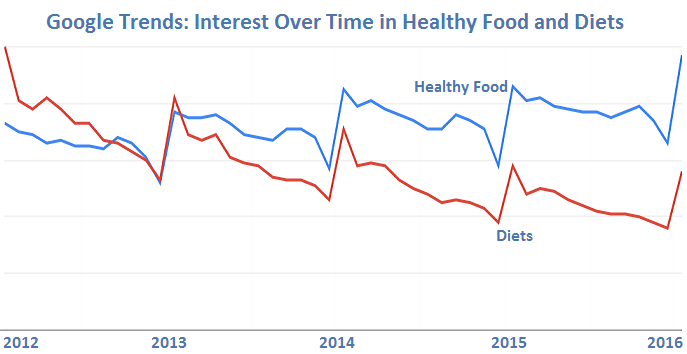
Good Food and Healthy People
 Consumers are talking a lot about eating healthy food. While interest in diets is dropping, interest in healthy food is climbing. The trouble is, there’s no such thing. Good food is the real thing. Food itself is not healthy. As a matter of fact, whether it comes from a plant or an animal, it’s dead. As consumers of food, we can be healthy, but no particular food is going to guarantee our health. Cleveland Clinic preventive medicine physician Roxanne Sukol explains:
Consumers are talking a lot about eating healthy food. While interest in diets is dropping, interest in healthy food is climbing. The trouble is, there’s no such thing. Good food is the real thing. Food itself is not healthy. As a matter of fact, whether it comes from a plant or an animal, it’s dead. As consumers of food, we can be healthy, but no particular food is going to guarantee our health. Cleveland Clinic preventive medicine physician Roxanne Sukol explains:
“Healthy” is a bankrupt word. Our food isn’t healthy. We are healthy. Our food is nutritious. I’m all about the words. Words are the key to giving people the tools they need to figure out what to eat. Everyone’s so confused.
The real function of claims about the health effects of a particular food is to sell more of it. But too much of a good thing, especially food, is too much. So health claims can become a path toward rationalizing excessive consumption of a food that carries those claims. In the Washington Post, food writer Michael Ruhlman points out that “our beloved kale salads are not ‘healthy.'” And he goes on to say that “if all you ate was kale, you would become sick.”
Perhaps he is reducing his point to an absurd extreme. But it’s worth noting that one of the biggest shifts in the new dietary guidelines is to focus on patterns of eating — like a Mediterranean diet — that promote good health. Smart people are moving away from labeling individual foods healthy or unhealthy, good or bad.
Food is food. It’s not medicine. Let’s focus on enjoying good food and good health.
Click here to read more from the Washington Post and here to read more from NPR. Click here for a recent study of health claims on food packaging.
Red Onion Slice, Good in Soup, photograph © Earl / flickr
Subscribe by email to follow the accumulating evidence and observations that shape our view of health, obesity, and policy.
January 26, 2016

January 26, 2016 at 9:21 am, Mary-Jo said:
I totally get all this, Ted. I know it’s come out in light of the push to rename the Dietary Guidelines. But, I must admit that in dealing with my clients, sometimes talking of ‘healthy foods’ does resonate best with them in explaining which type of foods to choose regularly and which are health-promoting and disease-preventive. And, indeed, I do point out the ‘health halo’ marketing tricks re: many foods and diets. I just find that it kind of is implicit in the description ‘healthy foods’ the notion that these are ‘good foods’ which will help them get healthier. Speaking of bankrupt words, so is the word ‘diet’. Often, people immediately associate ‘diet’ with ‘restriction’ or ‘boring’ or ‘tasteless foods’ or ‘something I go on and off of’ when in fact it’s just a term to describe foods eaten and pattern of intake of these foods. I guess what I’m trying to say is that we can’t get too caught up on what and who SAYS things right or wrong, it’s more about getting people to DO what’s good for them. Speaking of words, I often think of words once spoken by a former Secretary of the USDA, Dan Glickman, who said, “our greatest challenge as policy makers and public health advocates remains to translate what the experts know in what people do.”(proceedings of childhood obesity conference, USDA 1998) . That is what keeps me going as I serve folks trying to make sense of it all. Just my humble opinion! 🙂
January 26, 2016 at 9:27 am, Ted said:
You are right, Mary-Jo. And you know first hand how complicated people’s relationships with food can become. Finding the way out of that jungle is anything but simple. I really appreciate your well-informed perspective.
January 26, 2016 at 10:54 am, Todd I. Stark said:
The way I understand the value of arguing over what I consider “linguistic hygiene” such as the way we use the words healthy and diet, is to identify underlying patterns of thinking about these things that can be broadly counter-productive. As I think Mary-Jo implies in her comment, we wouldn’t be healthier just be using a different word from “diet,” but we may well be healthier by eating differently than the crude selective restriction pattern people associate with dieting.
What we probably need to do is give people better strategies, rather than just remind them that the popular pattern is counter-productive. That’s a necessary part of the argument, but if we keep stopping there, people have nothing to replace it with. It gives the useful critique of the bad thinking, but not something to do that is better.
I guess maybe the challenge is that the better thinking is not simple. There is a learning curve and a fair amount of individual variation in things individuals usually need to do to eat in a more nourishing, less compulsive way and one which compensates for the extremes and hazards of the modern environment.
January 26, 2016 at 11:00 am, Ted said:
Well said, Todd.
January 28, 2016 at 4:36 pm, Allen Browne said:
The comments are excellent. We need to try to make sense of it all and give our patients better strategies. Good challenges.
Allen